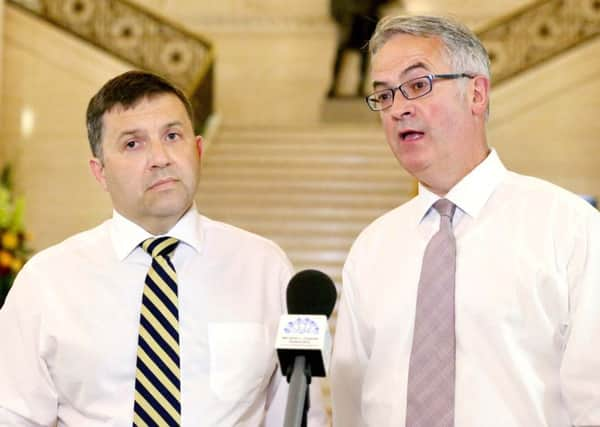'˜Inner circle of DUP, SF deciding future of SHA'


SDLP Justice spokesman Alex Attwood has told the News Letter he is gravely concerned at what he sees as the lack of transparency.
His party went into opposition in May, but he says the three smaller executive parties - UUP, SDLP and Alliance - have been frozen out of talks about the shape and implementation of the Stormont House Agreement (SHA) agreed in December 2014, since the subsequent Fresh Start deal of November 2015.
Advertisement
Hide AdAdvertisement
Hide AdMr Eastwood said SDLP leader Column Eastwood wrote to London and the Department of Justice for more details about progress.
“The Secretary of State wrote back to say conversations were ongoing and it was not appropriate to talk,” Mr Attwood said. “But this is not how to work out policy. There were five parties and two governments in the talks that led to the Stormont House Agreement”.
His party recently asked Justice Minister Claire Sugden for information about her role in the talks, but she redirected all inquiries to London, he says. (The minister said she has since agreed to meet with the SDLP on the issues).
In November last year Mr Brokenshire shared a second version of the SHA legislation - the London Legacy Bill - with the DUP and Sinn Fein, but not with other parties, said Mr Attwood.
Advertisement
Hide AdAdvertisement
Hide AdHe added that Mr Brokenshire had said the latest details on the bill will soon go into “a public phase”. But the MLA expressed concern it could be presented as “a fait accompli”.
The UK and IRA may have “a common interest” on cases such as Stakeknife, he said, in that neither would like to see details of a British agent inside the IRA being party to 50 murders.
He added: “The danger is that it will be all about the appearance of information recovery but offering very little substance to victims and survivors.”
Similarly, the UUP said history showed the DUP and Sinn Fein “are not to be trusted”.
Advertisement
Hide AdAdvertisement
Hide AdA spokesman said: “We were consulted recently by the Secretary of State on dealing with the past and we put points to him which he was previously unaware of. We would expect to be involved if and when the Secretary of State decides to make a move on implementation.”
In Friday’s Belfast Telegraph Mr Brokenshire said that he would “not be a party to the rewriting of history” adding that “the vast majority” of people killed in the Troubles were murdered by terrorists, while “the vast majority” of those who worked with the security forces did so with distinction.
But in an apparent response, Sinn Fein’s Martin McGuinness released a statement which said the UK government is refusing to engage about its national security veto on releasing intelligence information on the past.
“Unfortunately we are rapidly coming to the conclusion that the British Government isn’t serious – and never was serious – about resolving the outstanding legacy issues which were not concluded in the Fresh Start Agreement,” Mr McGuinness said.
Advertisement
Hide AdAdvertisement
Hide AdBut TUV Leader Jim Allister said there is no suggestion in the process of a change to the current legal definition of victim - which critics say equates killers and victims.
“Sinn Fein/IRA succeeded in its demand that ‘legacy inquests’ should continue separately from the new and inferior Historical Investigations Unit (HIU),” Mr Allister said.
“Thus the republican pursuit of the security forces can continue unabated and their attempts to re-write history are aided. The HIU will be overseen by Sinn Fein/IRA members of the Policing Board.”
There will be no compulsion for terrorists to come clean, he added, and anything they say will be unverifiable.
Advertisement
Hide AdAdvertisement
Hide AdAn NIO spokeswoman said Mr Brokenshire has met “all the main political parties” to discuss the SHA progress.
He is clear that the process would benefit from “a more public phase” she added, and it is important that the public “have their say to build confidence in the new bodies”.
Meanwhile the DUP said the responsibility for legislation lies with the NIO but that the DUP position is that there is “no sell-by date on justice” and it will oppose any process to “rewrite the past.”